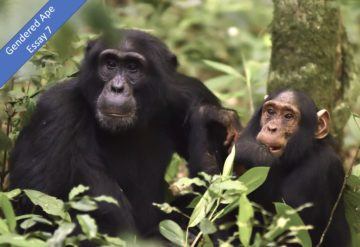Editor’s Note: Frans de Waal’s new book, Different: Gender Through the Eyes of a Primatologist, has generated some controversy and misunderstanding. He will address these issues in a series of short essays which will be published at 3QD and can all be seen in one place here. More comments on these essays can also be seen at Frans de Waal’s Facebook page.
by Frans de Waal

Since men lack a nurturing instinct, we can’t expect them to take care of kids. It would be “unnatural.”
This false appeal to biology is often heard in defense of traditional gender roles. Thus, Fox News’ Tucker Carlson mocked the paternity leave of U.S. Secretary of Transportation Pete Buttigieg as a way of “trying to figure out how to breastfeed.”
At first sight, the behavior of other primates supports the assertion that caretaking is not for males. Male apes may offer protection to mothers and young, but that’s all. Raising offspring is a female job. The maternal load is so heavy that bonobos and chimpanzees get pregnant only every five or six years. They cannot handle more progeny. Mothers carry the youngest on their belly, a juvenile on their back, while an older one follows them through the forest. Young apes remain dependent for up to a decade, and mothers receive no assistance to speak of.
But oddly (or perhaps not so oddly if we assume that the genders are psychologically more similar than different), males are perfectly capable of childcare. They have a remarkably well-developed caring “potential”. We sometimes get a glimpse of this potential after a mother’s death, when there is all of a sudden an orphan whimpering for attention.
Adult male chimpanzees in Taï Forest, in Ivory Coast, have been known to adopt a little one and lovingly care for it, sometimes for years. DNA evidence indicates that the adoptive males were not necessarily the fathers of their charges. Yet, they’d slow down their travel, frantically search for the adopted youngster if he or she was lost, and be as protective as any mother.
In Kibale National Park, in Uganda, an outbreak of respiratory disease killed many chimpanzees resulting in multiple orphans. Four of them were post-weaning and lucky enough to have an adolescent brother. The older brothers adopted the youngsters, were extremely vigilant and responsible, frequently groomed them, provided reassurance when they were frightened, and defended them against aggression. Like a mother, they would never move on without checking on their sibling to make sure that they were following.
Clearly, male chimpanzees possess a well-developed fatherly potential even if it’s seldom expressed and not necessarily based on actual paternity.
The males of our species go further than this, because we evolved nuclear families. Our history of male involvement with the young has strengthened paternal caring tendencies. As everything in our species, family arrangements are highly variable, but they do mean that fatherly care is as natural to humans as motherly care even if the two differ in kind.
As anthropologist Sarah Hrdy puts it, our species is marked by highly cooperative offspring-care, much more so than most other primates. As a result, we have reduced the interval between pregnancies, which is about two years shorter in human hunter-gatherers than in the great apes. This has allowed us to put 8 billion people on earth, which is both a huge success and a huge problem.
When men become fathers, they move from mate hunting to responsible fatherhood: their testosterone level drops. Those who are primary caretakers even change their brains. These fathers are closer to their children than most men, and worry about them every day. They have increased oxytocin levels in their blood and a more active and better-connected amygdala in their brain. Neurologically, they take on maternal characteristics.
Keep this neural plasticity in mind when anyone claims that childcare is “unnatural” for males.
BTW – The male caretaking potential isn’t limited to primates. For example, male rats aren’t known to care for pups, yet will do so if left alone long enough with them. The same is true for chickens. Charles Darwin noted in his diary that a capon (a neutered rooster) “will sit upon eggs as well as & often better than a female.”
FURTHER READING
The Uganda report comes from Rachna Reddy & John Mitani (2019). Social relationships and caregiving behavior between recently orphaned chimpanzee siblings. Primates 60: 389–400.
See also https://journals.plos.org/plosone/article?id=10.1371/journal.pone.0008901
For further details and references to the literature, read “Different: Gender Through the Eyes of a Primatologist” (Norton, 2022). A video about the book can be seen here: https://fb.watch/ffbauZBzNb/
